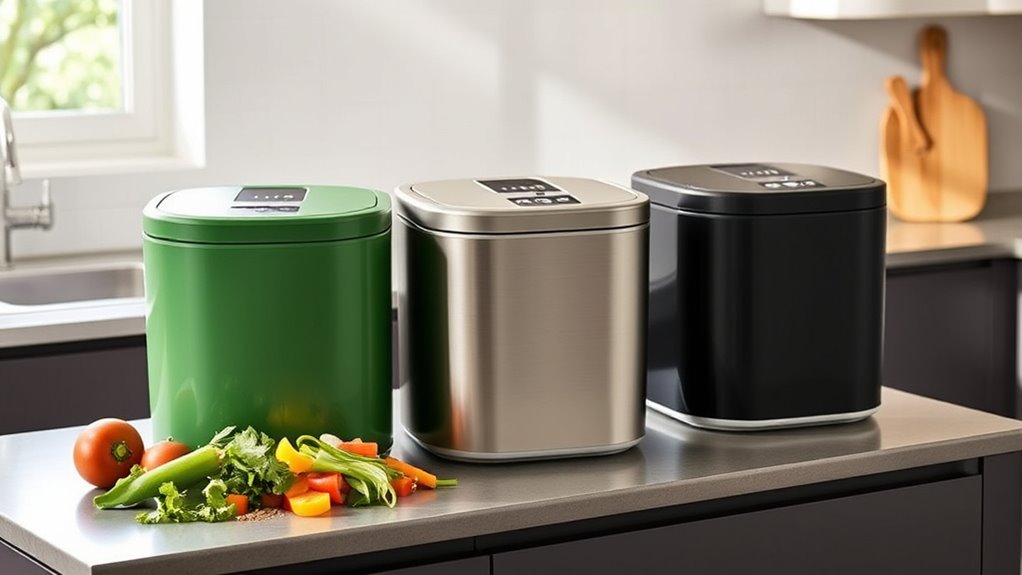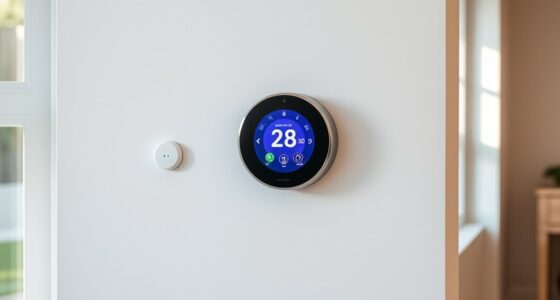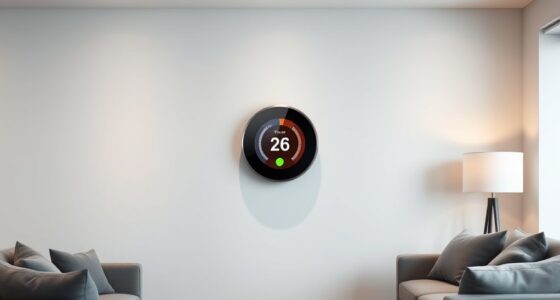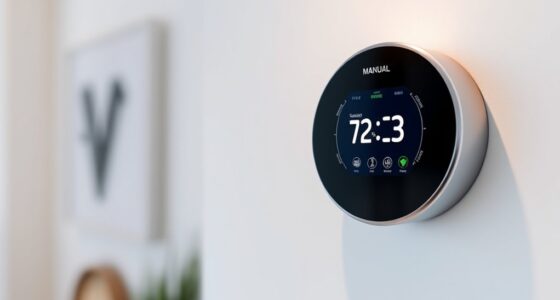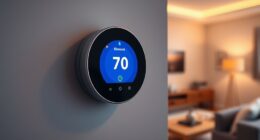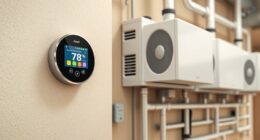If you’re looking for the best electric compost bins for your kitchen, I recommend considering compact models like the 3L electric composter or the stylish 4L smart options. They’re fast, quiet, and perfect for small households, transforming food waste into fertilizer in just a few hours. These eco-friendly solutions help keep odors at bay and save space on your countertop. Keep exploring to find out which features suit your needs best.
Key Takeaways
- Look for compact, stylish models like 3L or 4L capacity units that fit seamlessly on kitchen countertops.
- Prioritize fast composting times of 3–6 hours with quiet operation below 42 dB for convenience and minimal disturbance.
- Choose models with effective odor control features such as activated carbon filters and sealed lids.
- Ensure easy maintenance with auto-cleaning, removable parts, and replaceable filters for hassle-free upkeep.
- Consider additional features like transparent lids, multiple processing modes, and digital controls for enhanced user experience.
3L Electric Composter for Kitchen, Smart Compost Bin
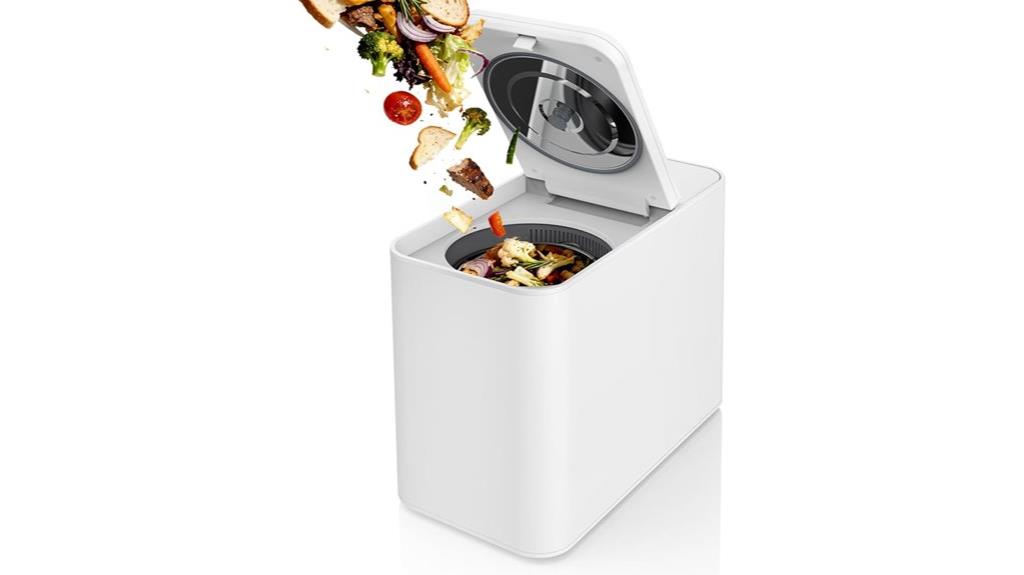
If you’re looking for an easy and efficient way to handle food waste at home, the 3L Electric Composter is a perfect fit. Its compact, stylish design easily fits on any kitchen countertop or corner without taking up much space. It features a built-in odor-filtering system with activated carbon that keeps smells at bay, plus a replaceable filter to maintain freshness. Operating quietly at just 42 dB, it’s perfect for overnight use. With an auto-cleaning function and one-touch start, composting becomes effortless. Within 4–6 hours, your food waste transforms into nutrient-rich compost, making your kitchen cleaner and greener.
Best For: those seeking a compact, stylish, and efficient kitchen composting solution that operates quietly and requires minimal maintenance.
Pros:
- Space-saving, elegant design fits easily on any kitchen countertop or corner
- Effective odor control with replaceable activated carbon filter keeps environment fresh
- Fast composting process converts food waste into nutrient-rich compost within 4–6 hours
Cons:
- Limited capacity of 3L may require frequent waste emptying for larger households
- Auto-cleaning function requires adding water and pressing a button, which may be an extra step for some users
- Operating noise at 42 dB, though quiet, may still be noticeable in very silent environments
3L Compact Electric Composter for Kitchen
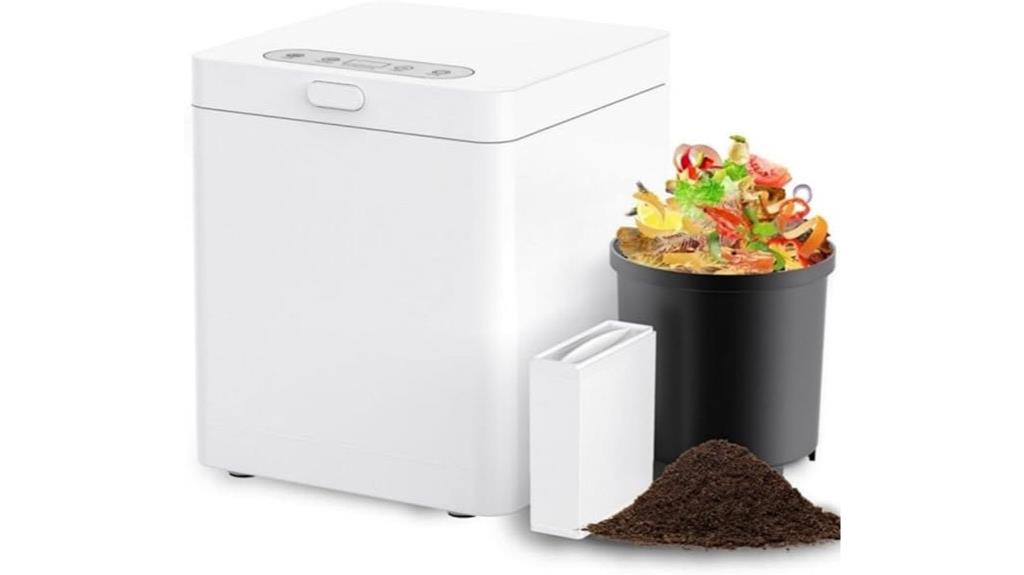
For anyone seeking a compact, efficient way to manage kitchen food waste, the L Compact Electric Composter stands out as an ideal solution. Its 3-liter capacity fits easily in kitchens, pantries, or gardens, and its space-saving square design ensures it doesn’t take up much room. Made from durable aluminum and finished in beige, it’s lightweight at just over 13 pounds. The composter converts food scraps into fertilizer in 4 to 6 hours, operating quietly overnight. With features like an auto-clean function, activated carbon odor filters, and a digital display, it offers hassle-free, odor-free composting that’s perfect for small spaces.
Best For: those with limited space seeking a quick, odor-free, and efficient kitchen composting solution.
Pros:
- Compact and space-saving design fits easily into various small spaces
- Fast processing time of 4-6 hours with quiet overnight operation
- Features like auto-clean and activated carbon filters make maintenance simple and odor-free
Cons:
- Limited 3-liter capacity may require frequent emptying for larger households
- Requires regular filter replacement to maintain odor control effectiveness
- Slightly heavier at over 13 pounds, which may be less portable for some users
4L Electric Composter for Kitchen, Smart Countertop Compost Bin, Odorless
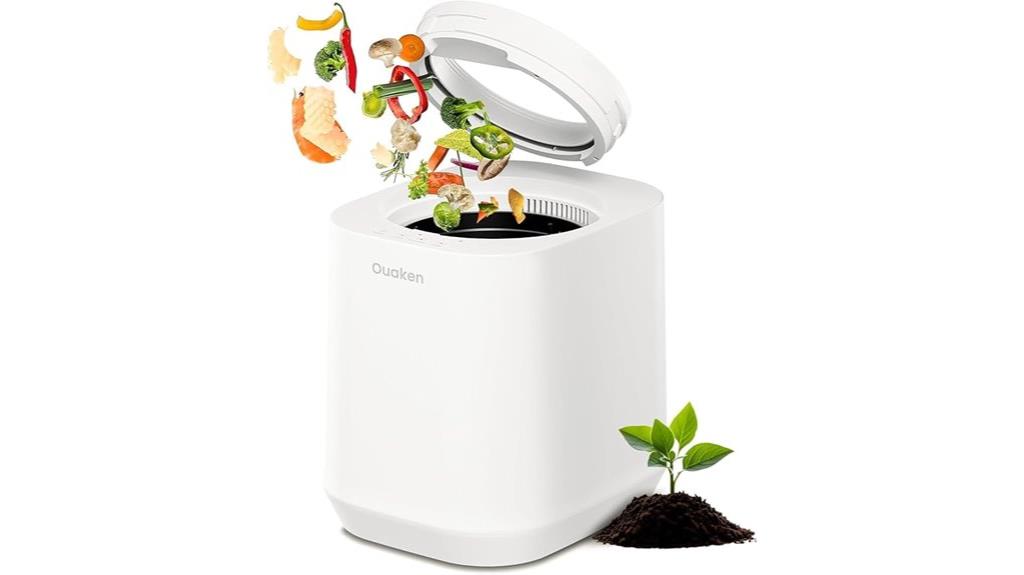
The Ouaken 4L Electric Composter is an ideal choice for busy households seeking an easy, odorless way to manage food waste indoors. Its sleek white aluminum design measures just over 10 inches wide, fitting neatly on any countertop. It transforms food scraps into nutrient-rich fertilizer in about three hours, thanks to high-temperature drying, grinding, and cooling. The unit operates quietly below 40dba and features a carbon filter that effectively eliminates odors, ensuring your kitchen stays fresh. With auto-cleaning and a transparent lid for monitoring, it offers effortless maintenance and convenience. This eco-friendly appliance reduces waste and supports sustainable living without sacrificing style or functionality.
Best For: busy households and individuals seeking an efficient, odorless, and eco-friendly way to manage indoor food waste.
Pros:
- Compact and sleek design fits seamlessly on countertops in modern kitchens
- Converts food scraps into fertilizer in approximately three hours with minimal noise
- Features auto-cleaning and a transparent lid for easy monitoring and maintenance
Cons:
- Limited 4-liter capacity may require frequent emptying for larger families
- Carbon filter lifespan of around 1000 hours necessitates regular replacement
- Higher initial cost compared to traditional compost bins
Factors to Consider When Choosing an Electric Compost Bin for Kitchen
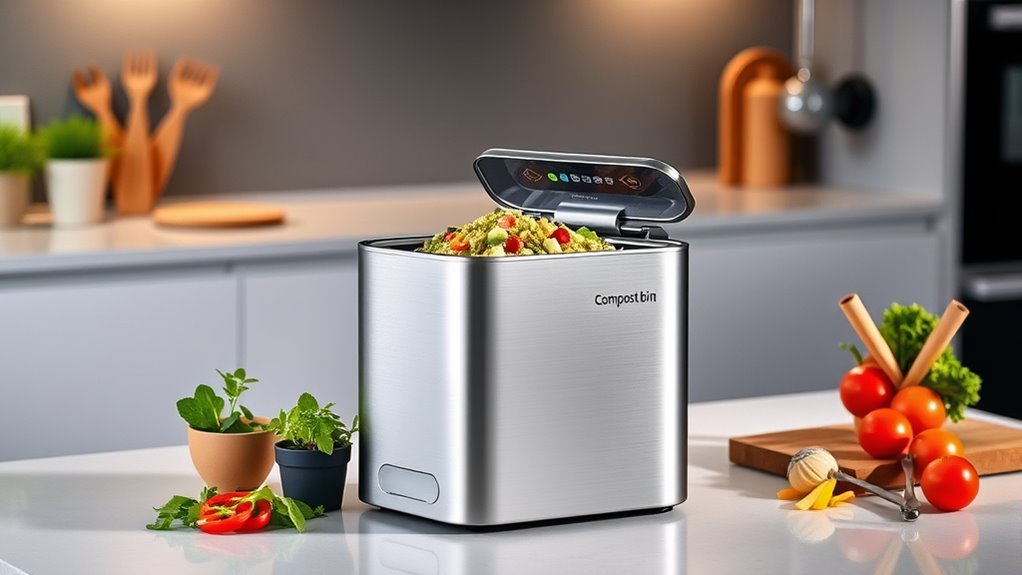
When selecting an electric compost bin, I consider factors like capacity and size to fit my kitchen space. I also pay attention to noise levels and odor control features to keep my environment comfortable. Finally, I look at cleaning, maintenance, and processing speed to ensure the bin works smoothly for my needs.
Capacity and Size
How do you choose the right electric compost bin size for your kitchen? First, consider how much food waste you generate regularly. A smaller bin, like a 3L or 4L model, works well if you have limited space or a small household, fitting comfortably on your countertop. On the other hand, larger capacities are ideal if you produce lots of scraps daily, reducing frequent emptying and maintenance. It’s also vital to measure the available area where you’ll keep the bin, ensuring it won’t clutter your kitchen or block movement. Striking a balance between capacity and space is key — you want a bin that’s efficient for your needs but still fits neatly into your environment. Proper sizing makes composting more convenient and keeps your kitchen organized.
Noise Levels
Choosing the right electric compost bin involves more than just size and capacity; noise levels also play a significant role in daily convenience. Most models operate below 42 dB, which is quiet enough for overnight use without disturbing sleep. This low noise operation guarantees your household remains peaceful, especially during late hours. Keep in mind, noise levels can vary depending on the mode you select—quick processing modes may generate slightly more noise. To ensure a quiet environment, look for models explicitly rated under 40 dB. These bins use high-torque, low-speed blades and sound-dampening features to minimize noise. Prioritizing low noise levels helps make composting a seamless, unobtrusive part of your daily routine, keeping your kitchen and home atmosphere calm and comfortable.
Odor Control Features
Effective odor control is essential for keeping your kitchen smelling fresh while composting. Many electric compost bins feature built-in activated carbon filters that absorb unpleasant smells, ensuring odors stay contained. These filters are typically replaceable, which helps maintain freshness over time and prevents odors from escaping during the composting process. Sealed lids and airtight compartments further enhance odor containment, making sure smells don’t leak into your kitchen. Some models even include advanced filtration systems or odor-neutralizing technologies for extra freshness. To keep odor control at its best, regular filter replacement and cleaning are vital. Choosing a bin with effective odor management features allows you to compost confidently without worrying about unpleasant smells disrupting your kitchen environment.
Cleaning and Maintenance
Cleaning and maintenance are crucial factors to contemplate when selecting an electric compost bin for your kitchen, as they directly impact ease of use and long-term performance. Look for models with auto-cleaning functions that use water or dissolving systems, making maintenance effortless. Choose bins with dishwasher-safe liners or removable parts to simplify manual cleaning. Regular filter replacement, especially activated carbon filters, is essential to keep odors in check and maintain hygiene; some units offer clear instructions or indicators for this. Opt for streamlined designs with minimal parts, reducing cleaning time and effort. Additionally, consider how easy it is to access and clean the interior, ensuring that your composting experience remains convenient and hassle-free over time.
Processing Speed
Processing speed is a key factor when selecting an electric compost bin because it determines how quickly your food waste gets turned into compost. Most models convert waste in about 3 to 6 hours, which is efficient for daily use. Faster modes, like quick or turbo settings, help reduce waste volume and odor more effectively, making the process more convenient. The type of technology used, such as high-temperature drying or grinding, directly affects processing times. Some bins offer multiple modes and adjustable times, giving you the flexibility to choose the speed that fits your schedule and needs. A more rapid processing cycle means waste spends less time in the bin, lowering the risk of unpleasant smells and pests, making it a vital feature for an effective kitchen compost system.
Frequently Asked Questions
How Long Does Composting Typically Take With These Electric Bins?
Composting with electric bins typically takes about 24 to 48 hours, depending on the model and the materials you put in. I’ve found that these bins accelerate the process by controlling temperature, moisture, and aeration, making compost ready much faster than traditional methods. For best results, I recommend chopping food scraps into smaller pieces and regularly mixing the compost inside the bin to keep things moving efficiently.
Are Electric Compost Bins Safe for All Kitchen Types?
Did you know that electric compost bins are safe for most kitchens? I’ve found that they’re designed with safety features like automatic shut-offs and sealed lids, making them suitable for various kitchen setups. I personally use one in my home, and it’s been hassle-free. Just guarantee proper placement and regular cleaning. Overall, they’re a safe, eco-friendly choice for composting in almost any kitchen environment.
Can They Handle Non-Food Biodegradable Waste?
Yes, electric compost bins can often handle non-food biodegradable waste like paper, coffee grounds, and yard waste, but it depends on the model. I recommend checking the manufacturer’s guidelines to confirm compatibility. I’ve found that some bins are specifically designed for a wider range of biodegradable materials, making them versatile for kitchen and yard waste. Always verify what types of waste your bin can process to avoid damage or inefficiency.
What Maintenance Is Required for These Electric Composters?
Maintaining an electric compost bin is pretty straightforward. I regularly empty the collection chamber and clean it with mild soap and water to prevent odors. I also check the sensors and verify the lid seals properly. Occasionally, I might need to replace the filter or deodorizer. Overall, it’s low-maintenance and keeps my kitchen smelling fresh while helping me compost waste efficiently.
Do Electric Compost Bins Require Special Power Outlets or Adapters?
No, electric compost bins usually don’t need special power outlets or adapters. I was surprised too! Most models work with standard household outlets, so you can plug them into any regular socket. Just double-check the voltage requirements listed in the product details. That way, you’re all set without needing extra equipment. It’s that simple—convenient and hassle-free, making eco-friendly composting easier than ever!
Conclusion
Choosing the right electric compost bin really depends on your kitchen size and lifestyle. Whether you opt for a sleek 3L model or a more spacious 4L version, these eco-friendly options make composting effortless and odorless. It’s like having a modern-day alchemist transforming waste into nourishment. So, take your time, weigh your needs, and embrace this sustainable shift—your future self will thank you, and Mother Earth will surely applaud.
